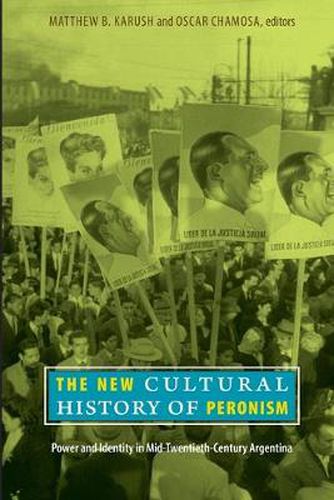Readings Newsletter
Become a Readings Member to make your shopping experience even easier.
Sign in or sign up for free!
You’re not far away from qualifying for FREE standard shipping within Australia
You’ve qualified for FREE standard shipping within Australia
The cart is loading…






In nearly every account of modern Argentine history, the first Peronist regime (1946-55) emerges as the critical juncture. Appealing to growing masses of industrial workers, Juan Peron built a powerful populist movement that transformed economic and political structures, promulgated new conceptions and representations of the nation, and deeply polarized the Argentine populace. Yet until now, most scholarship on Peronism has been constrained by a narrow, top-down perspective. Inspired by the pioneering work of the historian Daniel James and new approaches to Latin American cultural history, scholars have recently begun to rewrite the history of mid-twentieth-century Argentina. The New Cultural History of Peronism brings together the best of this important new scholarship.Situating Peronism within the broad arc of twentieth-century Argentine cultural change, the contributors focus on the interplay of cultural traditions, official policies, commercial imperatives, and popular perceptions. They describe how the Peron regime’s rhetoric and representations helped to produce new ideas of national and collective identity. At the same time, they show how Argentines pursued their interests through their engagement with the Peronist project, and, in so doing, pushed the regime in new directions. While the volume’s emphasis is on the first Peron presidency, one contributor explores the origins of the regime and two others consider Peronism’s transformations in subsequent years. The essays address topics including mass culture and melodrama, folk music, pageants, social respectability, architecture, and the intense emotional investment inspired by Peronism. They examine the experiences of women, indigenous groups, middle-class anti-Peronists, internal migrants, academics, and workers. By illuminating the connections between the state and popular consciousness, The New Cultural History of Peronism exposes the contradictions and ambivalences that have characterized Argentine populism.
Contributors: Anahi Ballent, Oscar Chamosa, Maria Damilakou, Eduardo Elena, Matthew B. Karush, Diana Lenton, Mirta Zaida Lobato, Natalia Milanesio, Mariano Ben Plotkin, Cesar Seveso, Lizel Tornay
$9.00 standard shipping within Australia
FREE standard shipping within Australia for orders over $100.00
Express & International shipping calculated at checkout
In nearly every account of modern Argentine history, the first Peronist regime (1946-55) emerges as the critical juncture. Appealing to growing masses of industrial workers, Juan Peron built a powerful populist movement that transformed economic and political structures, promulgated new conceptions and representations of the nation, and deeply polarized the Argentine populace. Yet until now, most scholarship on Peronism has been constrained by a narrow, top-down perspective. Inspired by the pioneering work of the historian Daniel James and new approaches to Latin American cultural history, scholars have recently begun to rewrite the history of mid-twentieth-century Argentina. The New Cultural History of Peronism brings together the best of this important new scholarship.Situating Peronism within the broad arc of twentieth-century Argentine cultural change, the contributors focus on the interplay of cultural traditions, official policies, commercial imperatives, and popular perceptions. They describe how the Peron regime’s rhetoric and representations helped to produce new ideas of national and collective identity. At the same time, they show how Argentines pursued their interests through their engagement with the Peronist project, and, in so doing, pushed the regime in new directions. While the volume’s emphasis is on the first Peron presidency, one contributor explores the origins of the regime and two others consider Peronism’s transformations in subsequent years. The essays address topics including mass culture and melodrama, folk music, pageants, social respectability, architecture, and the intense emotional investment inspired by Peronism. They examine the experiences of women, indigenous groups, middle-class anti-Peronists, internal migrants, academics, and workers. By illuminating the connections between the state and popular consciousness, The New Cultural History of Peronism exposes the contradictions and ambivalences that have characterized Argentine populism.
Contributors: Anahi Ballent, Oscar Chamosa, Maria Damilakou, Eduardo Elena, Matthew B. Karush, Diana Lenton, Mirta Zaida Lobato, Natalia Milanesio, Mariano Ben Plotkin, Cesar Seveso, Lizel Tornay